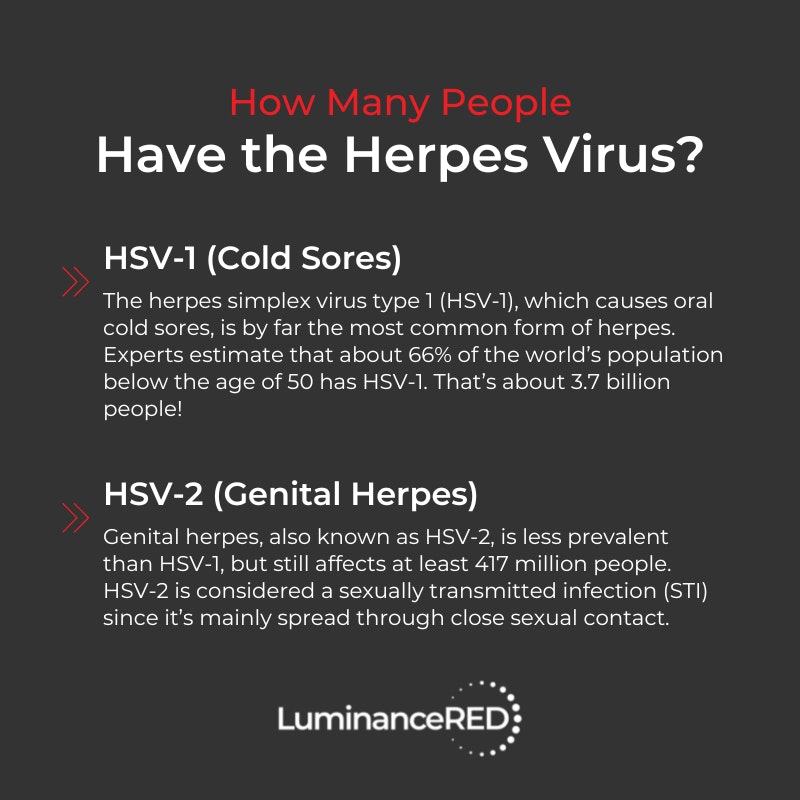Feeling Herpes Shame? Here’s the Truth Behind the Cold Sore Stigma

Plenty of medical conditions come with undeserved stigmas. One of the most stigmatized is herpes — partly because people aren’t well educated on this condition, and partly because many people don’t know the answer to the question, is herpes dangerous?
For a common, fairly non-threatening skin condition, the herpes stigma is much more extreme than it needs to be. Let’s take a closer look.
The Herpes Stigma
Even though herpes comes from the same family of viruses as the far less stigmatized chickenpox and shingles, the herpes virus is a target of prejudice. Some would argue that the herpes stigma is even more damaging to the afflicted person than the actual symptoms of the virus.
Psychologists believe this stigma exists for two reasons:
- Genital herpes is known as a sexually transmitted infection.
- Herpes does not have a cure.
Unfortunately, stigma around a medical condition is not a new phenomenon. People suffering from syphilis, HIV, and other communicable diseases are often stigmatized, as well.
Is Herpes Dangerous?
Perhaps a stigma around herpes exists because many people assume it’s dangerous.
Is herpes dangerous or life-threatening? In the vast majority of cases, no. Herpes isn’t deadly, and it usually doesn’t lead to any serious health problems.
However, herpes is dangerous for pregnant women. A pregnant woman who contracts genital herpes or has an outbreak during pregnancy puts the baby at great risk of premature birth or a life-threatening infection. Herpes can also cause significant complications in people who don’t have a fully functioning immune system.
Types of Herpes
There are two main types of herpes: the herpes simplex virus type 1 (HSV-1) and the herpes simplex virus type 2 (HSV-2). Contracting these viruses leads to an oral outbreak (cold sores, or oral herpes) or a genital outbreak (genital herpes), respectively.
While the herpes stigma plagues both, it’s much more prevalent with genital herpes.
Cold Sores
HSV-1 is a common cause of oral cold sores, and it’s by far the most common form of herpes. The World Health Organization estimates that about 67% of people under age 50 have HSV-1. That’s about 3.7 billion people worldwide!
Genital Herpes
Genital herpes is most often caused by HSV-2, though it can be caused by genital contact with HSV-1. Though it’s less prevalent than oral herpes, genital herpes still affects at least 417 million people. Genital herpes is considered a sexually transmitted infection (STI) because it’s mainly spread through close sexual contact.

What Are the Consequences of the Herpes Stigma?
The consequences of the herpes stigma pose a serious threat to the mental health of people with HSV-1 and HSV-2.
The herpes stigma can damage sexual intimacy, confidence, and self-esteem. People with herpes and their partners may not be sure when it’s safe to be intimate. Because of the perpetuation of the herpes stigma, people with HSV-1 and HSV-2 struggle to have honest and open conversations about their condition.
Due to the fear of the herpes stigma, people with herpes often feel anxious about their diagnosis. They worry about revealing the truth to current and former sexual partners, especially if they have genital herpes.
If a person doesn’t inform past partners of their diagnosis because of the herpes stigma, those partners won’t get tested for the virus and may unknowingly pass it along to future partners. The herpes stigma not only affects the individual, but creates a ripple effect that contributes to the prevalence of this medical condition.
History of the Herpes Stigma
It seems irrational to harbor such a strong stigma against a virus that impacts such a large portion of the population. After all, many of the people stigmatizing herpes may have it themselves! And unlike other stigmatized diseases, such as HIV and AIDS, herpes isn’t dangerous or likely to pose a serious health threat to most people.
So, how did herpes gain such a bad reputation?
The herpes stigma dates back to the 1970s and continued over the following decades. It was around this time that newspapers and magazines began labeling genital herpes an “epidemic.” A TIME magazine cover from 1982 even sported the headline “Today’s Scarlet Letter: Herpes.”
Many articles suggested that only sexually promiscuous people with questionable morals became infected with genital herpes. This is obviously not true, but it definitely contributed to the herpes stigma and the misguided belief that herpes is dangerous.
Herpes’ reputation took on a life of its own. A significant number of Americans believed herpes was an untreatable, dangerous disease that caused long-term health dangers.
Even though we’ve come a long way since the 1970s in terms of public health knowledge, the herpes stigma is still alive and well.
There are two factors that have likely perpetuated the herpes stigma. The first is that herpes is considered a sexually transmitted disease, a type of medical condition people are more likely to be judged for. The second is that herpes does not have a cure, and people tend to be more wary of permanent medical conditions. Furthermore, an active herpes outbreak comes with some pretty unpleasant symptoms that definitely impact a person’s sex life.
Generally, the cold sore stigma is less pervasive than the genital herpes stigma, since cold sores only develop on the face and aren’t always associated with sexual transmission. Given that nearly two-thirds of the planet’s adult population has oral herpes, cold sores are much more normalized than genital herpes.
The genital herpes stigma also prevails because people don’t understand this condition. Many assume they can catch genital herpes from a toilet seat or other common surfaces; they aren’t educated about how HSV-2 spreads or affects the body. Others don’t know that genital herpes remains dormant for months or years at a time, allowing those infected with the herpes virus to live a normal life.
How to Cope With Being in a Relationship When You Have Herpes
Despite the 1982 Time cover that declared herpes a “Scarlet Letter,” the herpes virus does not have to disrupt your life, even if you want to be or already are in a romantic relationship.
With more education and simple, commonsense precautions, you can enjoy a safe and satisfying romantic life with a herpes diagnosis.
Protect Your Partner
If you’re already in a relationship, remember that herpes is highly contagious. You need to take strict precautions to prevent the spread of the herpes virus to your partner.
Fortunately, the risk of genital herpes transmission drops significantly with consistent condom and antiviral medication use. One study following over 1,450 heterosexual couples found that only 1.9% of susceptible partners became infected with clinically symptomatic HSV-2 when given a popular antiviral medication as a precautionary treatment.
You can also limit the risk of transmission by abstaining from intimate contact until each herpes outbreak clears and heals completely. From the time you begin to feel the itching or burning sensation of developing herpes sores until your outbreak has completely scabbed and healed, consider the virus highly contagious for your partner.
Sometimes the simplest acts are the most powerful. Implement these simple hygiene practices to ensure you don’t accidentally spread the herpes virus to your partner.
- Keep the infected area clean and dry.
- Avoid touching the sores as much as possible.
- If you need to touch the sores to clean or apply medication, wash your hands thoroughly afterward.
- Never pick at the herpes sores. This is one of the fastest ways to cause an infection.
- Avoid activities and actions you know are likely to cause an outbreak or make a current outbreak worse.
- Do not share intimate items with your partner during an active outbreak, including razors, towels, or clothes that may come into contact with the sores.
Once the herpes heals completely and you can engage in sexual contact again, practice safe sex with your partner. Even following the precautions listed above, your partner should get tested for herpes regularly as part of their sexual healthcare plan.

Dating and New Relationships
Dating and starting a new relationship can be particularly challenging for people with herpes because of the persistent stigma.
A recent study found that people with STIs are more likely to feel negative emotions around their diagnosis, including embarrassment, shame, isolation, and anxiety — all emotions that are sure to negatively affect your love life. When it came to dating and new relationships, study participants were more likely to suffer from a fear of rejection and a fear that they would not be sexually desirable to current or future partners.
To help cope with these emotions, educate yourself as much as possible about your condition. This will empower you to educate others and help you understand the risks of taking on new sexual partners.
Always inform a new partner of your diagnosis before engaging in any sexual contact. Opt for an in-person conversation whenever possible. Be prepared for your partner to ask questions like “Is herpes dangerous?” Stay calm and try to be confident. Remind yourself that this condition is not a reflection on your character or value.
While dating can be more challenging because of the herpes stigma, it doesn’t have to derail your chance of finding a new partner.
The Herpes Stigma: Final Thoughts
The herpes stigma shouldn’t be a lasting roadblock to your happiness and confidence. Finding an effective and preventative oral herpes and genital herpes treatment can make all the difference.
If you’re coping with oral or genital herpes and you’re ready to gain control of your condition, consider the Luminance RED light therapy devices. These FDA-registered lip and genital sore treatment devices use advanced LED technology to produce medically optimized red light therapy for the management of herpes outbreaks.
Light therapy has been shown to reduce healing time, achieve pain relief, and delay recurrent herpes outbreaks. In fact, clinical studies show that patients who receive light treatment averaged an 82% reduction in pain and a 60% reduction in viral load. This safe and powerful treatment is an excellent resource to help you overcome the herpes stigma and tackle each new day with confidence.


















